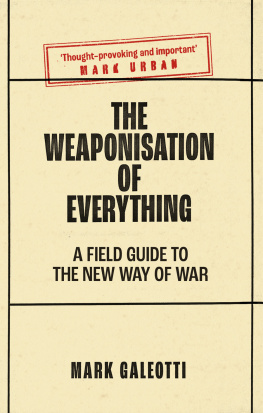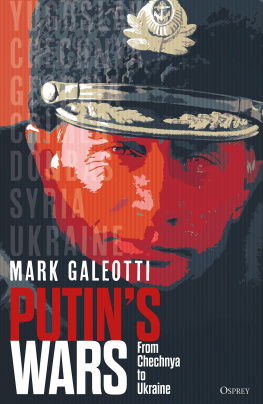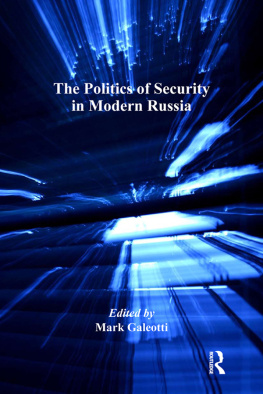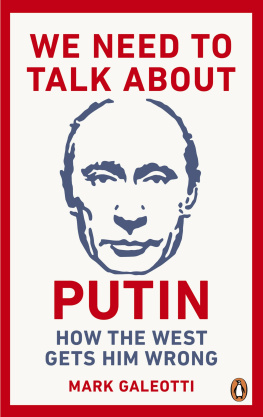THE WEAPONISATION
OF EVERYTHING

Copyright 2022 Mark Galeotti
All rights reserved. This book may not be reproduced in whole or in part, in any form (beyond that copying permitted by Sections 107 and 108 of the U.S. Copyright Law and except by reviewers for the public press) without written permission from the publishers.
For information about this and other Yale University Press publications, please contact:
U.S. Office:
Europe Office:
Set in Sabon MT by IDSUK (DataConnection) Ltd
Printed in Great Britain by TJ Books, Padstow, Cornwall
Library of Congress Control Number: 2021941543
e-ISBN 978-0-300-26513-2
A catalogue record for this book is available from the British Library.
10 9 8 7 6 5 4 3 2 1
To Anna, in the expectation that there will continue to be more swords than ploughshares around
Contents
Introduction
Its the day after tomorrow and, suddenly, the lights start going out. Trains coast to a stop on their tracks, factories on night shift grind to a halt and frustrated teenagers across the country wonder where the broadband has gone. It will later transpire that, for more than a year, hackers had carefully, professionally bypassed the seemingly impressive array of defences, backups and failsafes meant to secure the power grids supplying both eastern and western Japan. Electricity is still being generated in nuclear plants, wind turbines and old-fashioned fossil-fuel burners alike, but it simply isnt getting anywhere; the national grids are gridlocked. It will take forty-eight hours before the systems are finally cleared of the hostile malware and rebooted, two days in which everyone is reminded of their dependence on steady, plentiful and above all reliable power.
This is a largely bloodless attack, but not wholly so. There are fatalities in intensive care units where backup generators are not enough or are too slow to come online. Seventy-one people die in road accidents as traffic lights go dark. There is a litany of needless, trivial tragedies, as people fall down stairs in the sudden dark or, in one case, a man has a panic attack in a stuck lift in Osaka so severe that he kicks out the window and jumps to his death.
Who do you call in when its a true national crisis? The military is deployed to deal with some of the secondary effects. One corollary casualty is its capacity to take part in the Keen Sword exercises the Japanese Self-Defence Forces had been about to stage with the US: soldiers are instead busy getting generators to care homes or helping the police patrol the streets against sporadic, opportunist looting.
The government quickly announces that this was an attack, even though it lacks a clear answer at first about how, let alone who. However, for months the public have been groomed, titillated or enraged by hostile media accounts of corruption and, in particular, mishandling of the national infrastructure. They are thus uncertain what to believe, and then decisively sway against the administration when hacked official emails are leaked, showing that ministers had been warned that a combination of legacy systems and penny-pinching updates risked catastrophic, cascading failures within the electricity grids. These emails are, worse yet, real. Spokespeople do their best to explain the context, that these warnings were offset by others which affirmed that the system was sturdy and fit for purpose, but this sounds weak and self-serving, especially as some of the other documents, it emerges, have been wiped from the governments systems.
It looks from the outside like a cover-up. The governments counter arguments are buried in a media feeding frenzy, stoked by suborned, genuinely outraged or simply opportunistic opinion-formers, from politicians to TikTok stars. A video mocking the prime minister, who had unfortunately spoken beneath a campaign slogan reading the power to do good, goes viral, just as a picture of a photogenic young woman crying at the funeral of her 96-year-old grandfather an ex-paramedic, who ran marathons for charity into his eighties becomes the image of the aftermath. Was granddad not fit for purpose, prime minister? reads the headline in one tabloid.
Beijing had bid to replace the primary national grids of Japan two years back, although this had been disallowed on national security grounds. Now, a consortium 51 per cent owned by a Chinese power corporation makes a new offer, to rebuild the network with its own technology, at a bargain basement price, and at speed. The chairman of the parliamentary foreign affairs and defence committee had been one of the most trenchant critics of the original deal, but before he can comment, he is tragically killed in what the police conclude, for lack of any alternative evidence, was a bungled mugging. Others nonetheless still claim that this is all a complex ploy to win the contract and, with it, potentially gain control over the national grids. The consortium, though, includes a number of smaller Japanese companies which see their potential profits at risk. They, in turn, have sharp-toothed and well-paid lawyers on retainer, and a flurry of libel writs soon follows. Whether they are successful is arguably irrelevant: the potential cost of defending the cases prices many out of the battle and deters many more. People stop talking about the risks, at least in public.
Meanwhile, Beijing, while piously stating that it hopes Sinophobia is not going to determine politics, deploys its big gun, offering the giant panda Chu Lin to the Ueno Zoological Gardens in Tokyo. The deal goes through. And China gets a contract, a victory and, maybe, that long-term leverage it was looking for.
That is a nightmare scenario, a highly unlikely one, surely. But then again, so too was the idea that nineteen jihadists with boxcutters could hijack four airliners in the skies over the US in 2001 and carry out the deadliest terrorist attack in history. Or, for Iran, that a computer worm called Stuxnet, smuggled on a USB stick into the Natanz nuclear facility buried deep underground, guarded by elite troops, anti-air systems and razor wire could make the centrifuges it was using to enrich uranium for bombs rip themselves apart. Or that Russia could seize part of a neighbouring state in 2014 almost without any shots being fired, while claiming it was nothing to do with them. Each of the elements of the scenario, from infrastructure hacks to murders, has already been used in the undeclared shadow wars of the twenty-first century.
Weapons are getting more and more expensive, publics (even in authoritarian regimes) less and less tolerant of casualties and, anyway, the days when power was measured by coal mines, warm water ports and square kilometres of farmland are over. States have always used non-military means to bully, bait and beguile their way to victory. However, the world is now more complex and above all more inextricably interconnected than ever before. It used to be orthodoxy that interdependence stopped wars. In a way, it did but the pressures that led to wars never went away, so instead interdependence became the new battleground. Wars without warfare, non-military conflicts fought with all kinds of other means, from subversion to sanctions, memes to murder, may be becoming the new normal.
In the process, the lines between war and peace can blur into near-irrelevance, and victory just means today was a good day, with no guarantees for what may happen tomorrow. Instead, we will live in a world of permanent low-level conflict, often unnoticed, undeclared and unending, and one in which even our allies may also be our competitors. We are already in a time when, especially in the context of the current confrontation between Russia and the West, there is talk of the weaponisation of this and that, from information to bizarrely football hooliganism. Yes, really: when Russian
Next page












